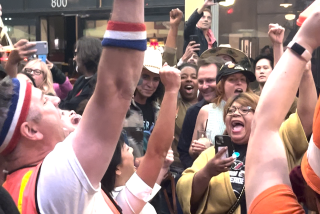Left out to dry by a trickle-down effect
- Share via
“Peace at Last?” said the headline in Variety.
Michael O’Donnell, a leadman and set dresser, had brought a copy of the Hollywood trade paper for his friend, Joe Sabella, a foley artist. On this day in mid-January, the news was that the Directors Guild of America had reached a new contract agreement with the Assn. of Motion Picture and Television Producers -- a deal, it was now hoped, that augured movement toward a settlement between striking writers and the AMPTP.
But for O’Donnell and Sabella -- who are part of that vast and largely forgotten below-the-line class of skilled entertainment industry labor -- the “peace at last?” question was not greeted just by hope but also a fair measure of cynicism and disillusionment.
“Both of them are failing their membership horribly,” was O’Donnell’s assessment of the WGA and AMPTP leaders.
There are signs that the strike might be approaching settlement, now that negotiators for both sides have resumed talks. But over lunch at an un-crowded Twain’s coffee shop not far from the CBS-Radford lot, O’Donnell and Sabella conveyed mostly frustration.
From their vantage point, this three-month-old writers strike amounts to an esoteric dispute between fat cats, less a face-off based in principle than in ego and grandstanding. Put another way, O’Donnell and Sabella don’t see a Democrat debating a Republican onstage; they just see two guys in suits, and out of touch with the people hit the hardest.
“This is a factory town,” O’Donnell said, later adding, “If we were in Detroit we’d be making Thunderbirds.”
Given their union affiliation -- Sabella and O’Donnell belong to the International Alliance of Theatrical Stage Employees, or IATSE -- you’d think they’d naturally ally themselves with the WGA picketers.
But in fact, over a 90-minute discussion, their ire was directed more at their union brethren, particularly the political leadership at the top: WGA President Patric Verrone and chief negotiator David Young.
“Non-concern” was the term Sabella would later use, struggling to find a word that captured the disregard from above for people like him, put out of work.
Joining them for lunch were Sabella’s wife, Alexandra, and O’Donnell’s ex-wife, Gail. Gail O’Donnell has phoned everyone from NBC-Universal chief Jeff Zucker to President Bush, alarmed that higher political powers have remained silent as the local economy suffers.
If the men conveyed resignation, the women wore their fear more readily. Alexandra Sabella brought out a copy of a letter written in November by IATSE International President Thomas C. Short to Verrone, criticizing WGA chief negotiator David Young for public comments in which Young seems to revel in “the havoc I’ve wreaked.” (Young subsequently has claimed that he was misquoted.)
A comment like that trickled down to the table at Twain’s as indicative of the “non-concern.”
Sabella, 54, has a daughter in school in Thousand Oaks and a monthly nut of around $8,000, he said. To fill up his time and bring in some cash, he’s been waxing motorcycles and cars, a longtime vocation.
As a foley artist, it is Sabella’s job to provide much of the ambient, naturalistic sound audiences take for granted. When the strike hit, Sabella was working on all the “CSI” procedurals on CBS.
For instance, if characters are doing an autopsy, “we do the cutting into the flesh, the opening of the flesh,” he said.
O’Donnell, 52, the leadman/set dresser, says he normally has to “hump a 90-hour week to take on two grand.” He knows the business all too well; his father, Charlie O’Donnell, is the longtime announcer on “Jeopardy.”
As a leadman on movies, he works closely with the set decorator, building up worlds and breaking them down; on “Terminator 3,” for instance, that involved turning a vacant lot into a veterinary clinic and back again into a vacant lot.
With a mortgage to pay on his Toluca Lake condo, he’s been working on an idea for a children’s TV show and is playing more guitar, jamming with other set dressers.
On the one hand, O’Donnell and Sabella understand the principle behind the WGA strike, the need to fight for a fair share of whatever revenue streams emerge from new media.
“The sons and daughters of the idle rich,” was what O’Donnell called the people who run the studios.
Mostly, though, they just want to get back to work -- even if these past three months have been a painful reminder that, to the creative community and the studio executives, guys like them are pretty much just needed when they’re needed.
Sabella would later compare himself to a tool in a drawer. “If we get tarnished and worn, they’ll just throw us away and get new ones,” he said. “We’re a tool, and we’ll be there when they open the drawer. Ready to work again.”
--
More to Read
The biggest entertainment stories
Get our big stories about Hollywood, film, television, music, arts, culture and more right in your inbox as soon as they publish.
You may occasionally receive promotional content from the Los Angeles Times.










